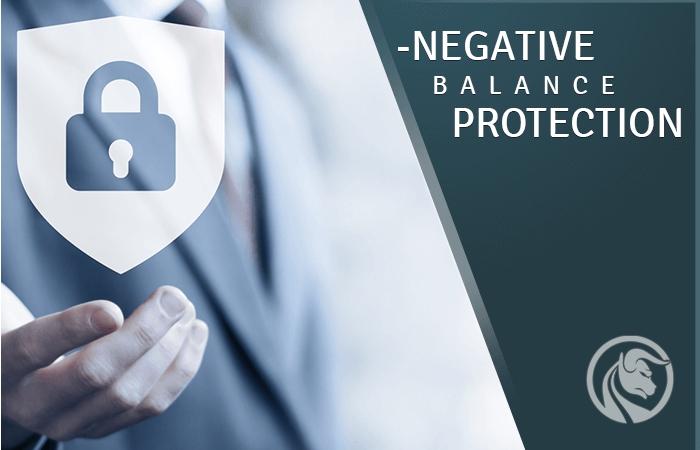Protection against negative balances. Safety or shot in the knee?
Protection against negative balances (from Negative Balance Protection - abbreviation of NBP) is an element of the offer that appears more and more often in brokers' offers. Many traders and some regulators see it as a solution to the most serious problems related to trading in leveraged markets. It is supposed to increase the protection of inexperienced Forex adepts against the brutal hand of the market. Is this the right direction and is it not associated with "hidden", negative consequences? Let us analyze this issue ...
What is debit protection
At the beginning an introduction for people who have not yet come across this concept.
In fact, Margin Call and Stop-Out mechanisms are to protect us from the overdraft. These are parameters set by the broker on the platform, which are intended to protect the trader's account (and indirectly the broker's interests) against the balance falling below zero by closing all positions or appropriately hedging them, in the event that the value of funds on the account is insufficient to maintain the position. Unfortunately, they have some limitations and in extreme situations it happens that the unfortunate overdraft arises, e.g. as a result of a price gap, publication of macro data, intervention of central banks, etc.
READ NECESSARY: What does Margin Call and Stop-Out depend on?
The title protection declared by the broker is therefore a kind of guarantee that is to assure clients that they will not be forced to compensate for a negative balance, regardless of the circumstances. Thus, a more accurate wording would be not "protection against overdraft" but "no need to repay the debt". The overdraft can be created anyway, however, the broker, through appropriate provisions in the contract, obliges to redeem it.
Regulators want protection
 Gradually a trend is emerging among European regulators who want to force (and enforce) on brokers to introduce protection against debit. Recently, this BaFIN made the decision, the German equivalent of our KNF, which gave brokers an ultimatum: "introduction of protection by August 10 or withdrawal from the market".
Gradually a trend is emerging among European regulators who want to force (and enforce) on brokers to introduce protection against debit. Recently, this BaFIN made the decision, the German equivalent of our KNF, which gave brokers an ultimatum: "introduction of protection by August 10 or withdrawal from the market".
The changes do not apply only to German brokers but all companies operating on the local market. This means that, for example, a British broker operating in Germany must provide protection against debit, even for German residents. This is the analogous situation with the limitation of leveraging to 1: 100 for Polish residents.
We hear similar voices from Cyprus and Great Britain, but without any official laws.
Usually, in tandem with the phrase "negative balance protection" / "overdraft protection", brokers indicate that it only applies to "non-professional clients", in other words retail clients. Thus, company accounts or persons identified through appropriate surveys (questions about experience, employment status, etc.) as professional or institutional clients may not be covered by such a guarantee.
To all Swiss guilty
 It doesn't take long to think where the mass idea of introducing these changes came from. Memorable January 15, 2015 left a mark on leveraged markets, in particular Forex market. The day of the release of the Swiss franc exchange rate resulted in a huge amplitude of fluctuations, as well as ... Debits on investment accounts. It is also a wave of complaints to regulators (sometimes and publicized in the media) in connection with the emergence of debt with "unaware" clients and the bankruptcy of brokers, such as Alpari UK.
It doesn't take long to think where the mass idea of introducing these changes came from. Memorable January 15, 2015 left a mark on leveraged markets, in particular Forex market. The day of the release of the Swiss franc exchange rate resulted in a huge amplitude of fluctuations, as well as ... Debits on investment accounts. It is also a wave of complaints to regulators (sometimes and publicized in the media) in connection with the emergence of debt with "unaware" clients and the bankruptcy of brokers, such as Alpari UK.
READ ALSO: Frank is crazy, brokers are counting losses
The situation is exceptional and the scale is huge, but probably if it were not for this day, no supervision would have crossed the mind to introduce this type of change in the offers of Forex brokers.
What are Forex brokers for?
Some companies, especially those operating in the Market Maker model and those with a well-thought-out security formula, decided to introduce faster and arbitrary protection against overdrafts. Frightened customers quickly began to look for offers that would guarantee them greater security. MM brokers found themselves in an exceptionally comfortable situation. As a party to transactions with customers, they only have to secure their own interests in the market (which is different). Thus, ultimately the introduction of said protection is relatively simple for them. But what about the others?
And here a certain doubt arises with brokers who are only intermediaries. Companies operating in ECN and STP models they merely transmit client orders to their liquidity providers (liquid provider, abbr. LP). When a trader's positions cause an overdraft, ultimately he is indirectly the debtor of the LP. It's just that the broker is officially in arrears with the payment and has to request its client to supplement it.
Unsuccessful (?) Consequences
 In this way, we move to the consequences in the face of changes introduced by regulators. STP and ECN brokers, whose client will cause a debit, will have to pay the amount due to the LP from their own pocket, i.e. ONLY from commission on completed orders. Meanwhile, the Market Maker can "take over" the customer's deposit if he only loses it "on the market". This puts him in a privileged position.
In this way, we move to the consequences in the face of changes introduced by regulators. STP and ECN brokers, whose client will cause a debit, will have to pay the amount due to the LP from their own pocket, i.e. ONLY from commission on completed orders. Meanwhile, the Market Maker can "take over" the customer's deposit if he only loses it "on the market". This puts him in a privileged position.
Remember that it was the introduction of the STP / ECN model to the retail market that revolutionized Forex 8 years ago. It is the conflict-free way of executing orders that caused the gray Kowalski to have access to low commissions, market spreads and express execution. Not only that, the increase in competitiveness and dissatisfaction with trading with MM brokers due to ever-appearing problems as soon as we started earning (delaying orders, requotes, price manipulation, contract termination, refusal to pay out profits ...) caused clients to turn their backs en masse and they wanted to trade in the "real market" (!).
READ ALSO: Dirty plays by brokers - TOP 5
The introduction of compulsory protection against overdrafts can have serious consequences. Both for us - traders and brokers with market execution of orders.
Some of them who decide to introduce changes will take the risk of repaying traders' debts from their own funds. This will lower their income, i.e. the funds allocated to development, and may lead to an increase in commission to compensate for the new cost. It also has an increased risk of bankruptcy when the January 15 rerun occurs. The fear is visible now - a few days before each major event (elections, voting), brokers massively reduce leverage. There may be more such limitations.
The second part will withdraw from countries where overdraft protection is required by law. This may lead to a strengthening of the position brokers Market Maker, reduce market competitiveness and return to unclean practices.
So is negative balance protection an increase in security or a step backwards?






















![Forex Club – Tax 9 – Settle tax on a foreign broker [Download the Application] Forex Club - Tax 9](https://forexclub.pl/wp-content/uploads/2024/02/Forex-Club-Podatek-9-184x120.jpg?v=1709046278)
![Trading View platform – solutions tailored to the needs of traders [Review] trading view review](https://forexclub.pl/wp-content/uploads/2024/03/trading-view-recenzja-184x120.jpg?v=1709558918)
![How to connect your FP Markets account to the Trading View platform [Guide] fp markets trading view](https://forexclub.pl/wp-content/uploads/2024/02/fp-markets-trading-view-184x120.jpg?v=1708677291)
![How to invest in ChatGPT and AI? Stocks and ETFs [Guide] how to invest in chatgpt and artificial intelligence](https://forexclub.pl/wp-content/uploads/2023/02/jak-inwestowac-w-chatgpt-i-sztuczna-inteligencje-184x120.jpg?v=1676364263)


![WeWork – the anatomy of the collapse of a company valued at $47 billion [WeWork, part II] wework bankruptcy story](https://forexclub.pl/wp-content/uploads/2024/04/wework-bankructwo-historia-184x120.jpg?v=1711729561)
![Adam Neumann – the man who screwed up Softbank [WeWork, part AND] adam neumann wework](https://forexclub.pl/wp-content/uploads/2024/04/adam-neumann-wework-184x120.jpg?v=1711728724)





![How to transfer shares to another brokerage office [Procedure description] how to transfer shares to another brokerage house](https://forexclub.pl/wp-content/uploads/2024/03/jak-przeniesc-akcje-do-innego-biura-maklerskiego-184x120.jpg?v=1709556924)

![The most common mistakes of a beginner trader - Mr Yogi [VIDEO] Scalping - The most common mistakes of a beginner trader - VIDEO](https://forexclub.pl/wp-content/uploads/2024/03/Scalping-Najczestsze-bledy-poczatkujacego-tradera-VIDEO-184x120.jpg?v=1711601376)
![Learning patience: No position is also a position - Mr Yogi [VIDEO] Scalping - Learning patience - No position is also a position - VIDEO](https://forexclub.pl/wp-content/uploads/2024/03/Scalping-Nauka-cierpliwosci-Brak-pozycji-to-tez-pozycja-VIDEO-184x120.jpg?v=1710999249)
![When to exit a position and how to minimize losses - Mr Yogi [VIDEO] Scalping - When to exit a position and how to minimize losses - VIDEO](https://forexclub.pl/wp-content/uploads/2024/03/Scalping-Kiedy-wyjsc-z-pozycji-i-jak-minimalizowac-straty-VIDEO-184x120.jpg?v=1710336731)


















Unfortunately, I once experienced the benefits of having protection on my own skin. Due to incompetent or even lack of risk management I led to clearing the account to (fortunately) zero and not falling into serious debts. As for me, the protection against the mortgage payment is a necessity especially for novice traders.
Hello Be FX,
From the perspective of a novice trader, it is a huge advantage and an increase in security. Of course, debit is the result of our actions (too much leverage, trading on highly variable instruments, etc.). Only now we come to a situation where the introduction of this protection suddenly becomes obligatory for every broker in some countries, but in consequence also results in a high probability of limiting the leverage by regulators.
More vividly - they require the introduction of airbags, but at the same time limit the maximum speed of vehicles by 70%. Security grows, opportunities decrease.